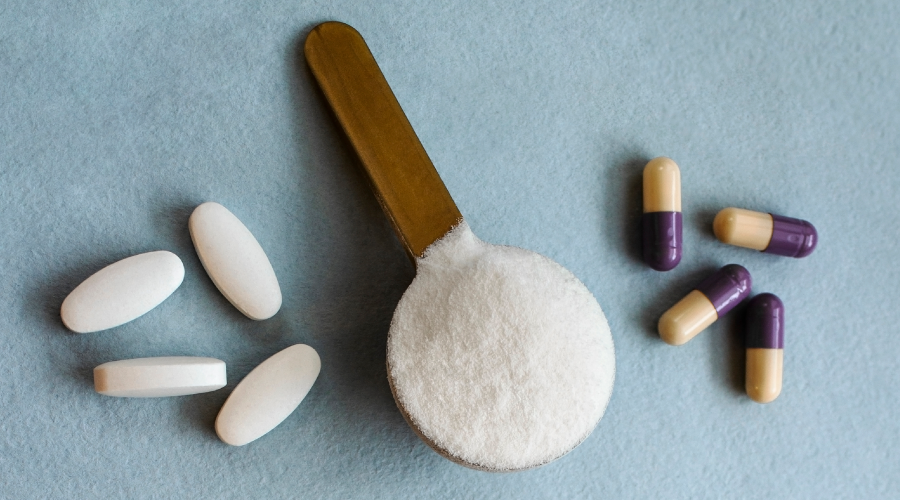

A type 1 and type 3 collagen product derived from cow skins is called bovine (beef) collagen. It is primarily used to improve joint and digestive health and is quite affordable. The skin and scales of fish are used to make marine (fish) collagen, which largely contains type 1 collagen. Marine collagen is generated sustainably, has a high bioavailability, and has been proven in clinical studies to help minimise wrinkle depth and boost skin moisture levels. With these options available, making a decision might be difficult.
Let’s understand both the types of collagen and simplify your decision-making.
Bovine Collagen Production and Sourcing
The most prevalent type of collagen in supplements is derived from cows and is known as bovine (or beef) collagen. The cow hides (skins) are removed after the animals are slaughtered for their meat and the collagen protein is then extracted.
The collagen proteins are hydrolyzed during this process, resulting in the formation of more easily absorbed amino acids. Consumers who want to avoid consuming collagen made via inhumane methods must specifically look for grass-fed beef because these skins can come from either regular feedlot cattle or grass-fed and finished cattle.
A large portion of the present supply of grass-fed collagen originates from Argentina and other nations with a long history of raising grass-fed cattle. Bovine collagen, derived from Argentina, is a fantastic option for customers because cattle in this country graze on grass all year long and are not given excessive amounts of antibiotics or synthetic growth hormones.
Functions of Bovine Collagen
The bovine collagen includes type 1 and type 3 collagen – two forms of collagen essential to the development and maintenance of:
- Bones
- Tendons
- Ligaments
- Skin
They make up the majority of the collagen found in cows. It goes without saying that collagen is the best source of the amino acids glycine and proline that the body needs in order to produce type 1 and type 2 collagen on its own. Collagen supplements provide the body with all the amino acids required to regenerate healthy connective tissue.
It will be done when it’s taken on a daily basis (may be in the form of a wonderful dairy-free keto coffee with MCT Oil and Collagen Peptides).
Health Benefits & Uses of Bovine Collagen
Listed below are some of the essential benefits of bovine collagen:
1. Reduced Joint Pain
Bovine collagen encourages the development of cartilage. It can cushion joints and reduce joint pain in conditions such as osteoarthritis and rheumatoid arthritis.
2. Better Gut Health
By using collagen, one can heal small holes in the gut lining which can lessen the symptoms of a “leaky gut”.
3. Better Recovery
When consumed after a workout, the amino acids in collagen can expedite athletic recovery.
4. Strengthening
Collagen can improve the efficiency of the recycling of ATP as cellular energy contributes to stronger muscles.
Why Should You Choose Bovine Collagen?
The majority of natural food stores, supplement retailers, and online retailers all carry bovine collagen which is simple to find and buy. Bovine collagen is also reasonably priced because there is a huge beef sector.
If you are allergic to shellfish and cannot take marine collagen as a result, bovine collagen is an excellent alternative.
Marine Collagen Sources and Production
Marine collagen supplements are a relatively recent addition to the supplement landscape, despite the fact that many traditional civilizations have traditionally ingested stocks and stews prepared from fish bones.
Fish scales and skin, which were previously discarded as trash, are hydrolyzed in the same way that cowhides are in the creation of bovine collagen to create marine collagen supplements. This type, obtained from fish like red snapper and cod that are caught sustainably or in the wild, has approximately the least detrimental environmental effects of any animal product. Its powder can also be consumed for various health benefits.
Functions of Marine Collagen
Similar to bovine collagen, marine collagen contributes the essential amino acids for the growth of strong, healthy connective tissue in the body. Compared to bovine collagen, the peptide molecules in marine collagen are smaller.
This makes them slightly more accessible and absorbable. Marine collagen, however, is nearly type 1 collagen. Amino acid hydroxyproline is a crucial component of skin, blood vessel walls, and other connective tissues. This component is particularly abundant in marine collagen.
Health Benefits & Uses of Marine Collagen
The health benefits of this type of collagen are:
1. Fewer Wrinkles
Rebuilding tissues using marine collagen increases skin suppleness and minimises wrinkles.
2. Reduced Ageing Symptoms
Marine collagen for skin is said to be good for health and also contains several antioxidants that shield the skin from free radical damage. Also, it delays the skin ageing process.
3. Moisturised Skin and UV Protection
Marine collagen has been scientifically shown to contribute towards greater skin moisturisation as well as protection against photoageing and UV damage.
Other Benefits of Marine Collagen
The marine collagen benefits are as follows:
- For pescatarians or those who eschew beef products, marine collagen is the ideal option.
- It is perfect for individuals interested in anti-ageing and enhanced beauty because of its favourable effects on the skin.
- Marine collagen doesn’t taste or smell fishy despite being made from fish because all the fish oils are removed during processing. As a result, it can be added to coffee or tea and won’t change the flavour or aroma of food.

Conclusion
You really can’t go wrong with either bovine or marine collagen. Both have significant health advantages and can keep your body healthy and attractive with regular use. It ultimately comes down to your preferences, dietary constraints, and health issues like allergies.




